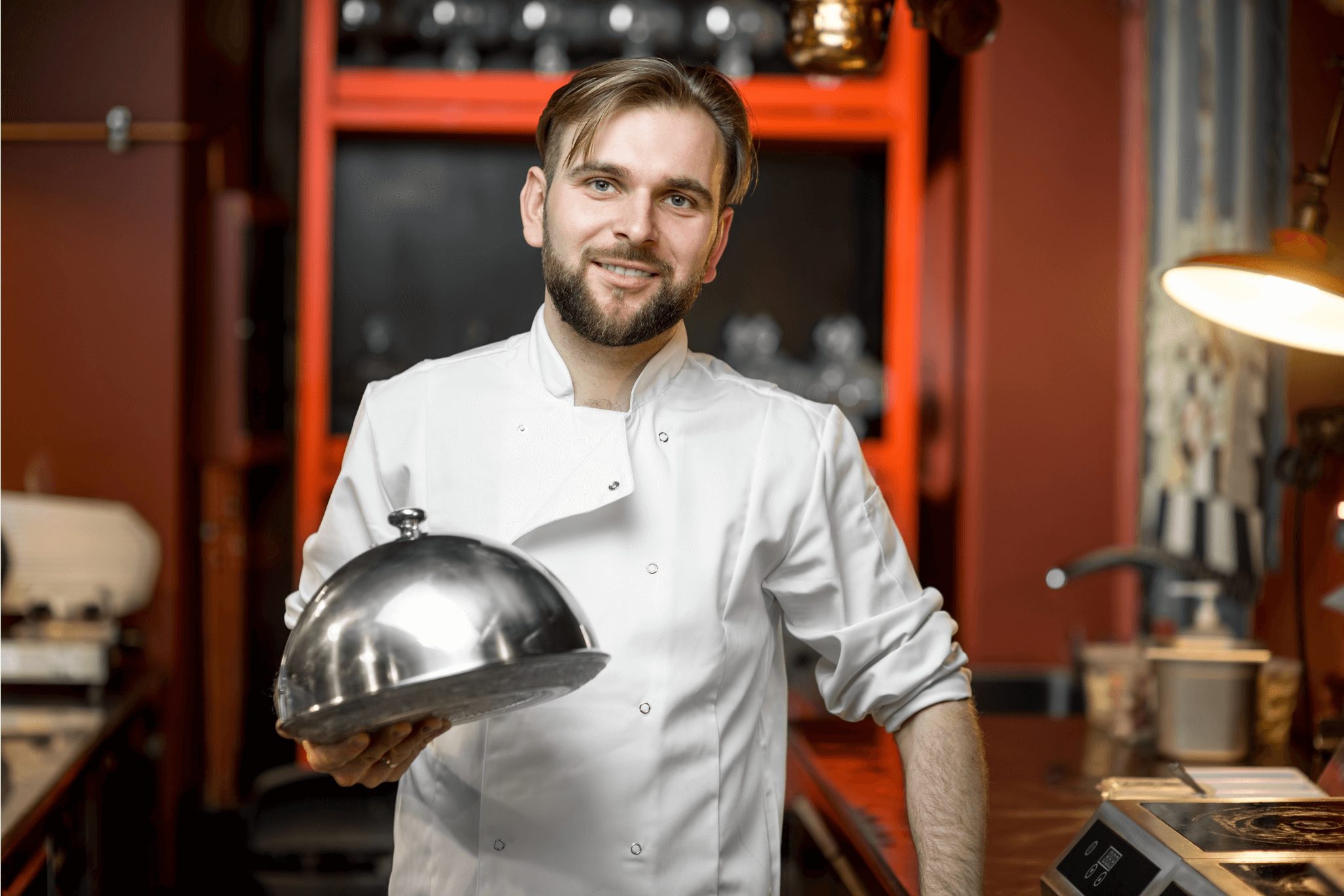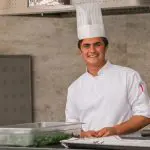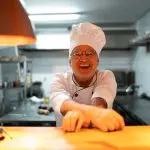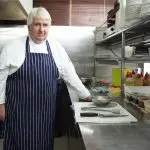Why Should I Consider The Chef Career?
Interested in a rewarding career that offers the potential to earn a great living, but flexibility and a lot of personal rewards?
If that sounds familiar, then becoming a professional chef may be the right career move for you.
In fact, there are quite a few reasons to follow the chef career path.
Want To Skip Ahead?
- Get Paid To Cook
- How To Become A Chef Book
- A Job Open To World Travel
- An In-Demand Career
- Are There Long Term Possibilities?
- Essential Kitchen Tools?
- How Kitchens Fit Into The Big Picture
- Health And Safety
- Books About The Chef Career
- Places That Chefs Work For
The Chef Career Path Options: Information, Books, Where Chefs Work.
Chefs get paid to cook
Cooking is one of the essential life skills, and it can be incredibly rewarding personally. However, as a professional chef, you can translate that love of cooking into actual pay.
Depending on your experience and training, as well as the restaurant in which you work.
Of course, there are many other possibilities, including opening your own restaurant, starting a catering company and more in which you can apply your training and cooking skills.
Travel the world as an experienced chef
One of the most enjoyable aspects of becoming a professional chef is the ability to travel. While some chefs spend most of their careers in one country, many do not.
- Once you’ve gained valuable training and have experience under your belt, you’ll begin to open doors for yourself.
- With a few years at a chef de partie position level, you will find that this puts you very much in demand with restaurants around the world.
- And it’s far easier than you might think to find jobs in other countries.
- You can start out in the UK, and find yourself working in Germany, France, Italy, the US, Australia, Canada and many other nations.
The chance to be creative as a chef
For too many people, there are very few creative outlets these days other than hobbies. While some people might be fine with only expressing their creativity in their personal time, that might not work for you.
As a chef, creativity will be part of your day-to-day routine.
You’ll be called on to put your own ideas on traditional dishes, create new dishes from scratch. Also finding new ways of accomplishing things, and more.
You’ll need to experiment with taste and texture, aroma and colour, and shape and form. For quite a few chefs, this is one of the most rewarding aspects of becoming a chef.
Demand for chefs is on the growth
When it comes to determining the right career path, you need to consider many factors. You definitely want to think about how personally rewarding each option might be, but you’ll also need to factor in job growth.
A professional career that is on the decline in terms of demand will not provide you with a lifelong income, and you will eventually find that you need to retrain for another position or another field entirely.
When it comes to career growth, chef positions are only growing in demand. More and more restaurants are opening around the world (and in the UK, in particular) and this means that there’s a greater need than ever before for skilled, creative, talented chefs.
Eat fantastic food
Of course, one of the most important benefits of getting on the chef career path is simply being able to enjoy great food.
Whether it’s something that you created yourself, an experiment by one of the junior chefs under your training.
Or the creation of a colleague, you’ll be surrounded by sumptuous foods, both sweet and savoury, hot and cold, in a stunning variety. For anyone with a passion for food, it’s probably pretty close to heavenly.
The chef career path
These are only a few of the many reasons to consider becoming a professional chef. Of course, the ongoing demand for skilled chefs also ensures that you will never go “out of demand”.
An in-demand career that anyone can learn
Learn essential cooking skills
There are so many great points about a career as a chef lets not forget the main point. Chefs learn to cook great food and work with fantastic ingredients.
The cooking skills a commis chef can pick up in a couple of years is broad. Even if you only spend a few years in a professional kitchen the skills learnt will last a lifetime.
And the benefits of being able to cook are massive including:
- Knowing how to cook healthy food
- Learning how to use cheap ingredients
- Cooking for family and friends
Consider this: you spent 3 years in a professional kitchen after finishing school. However, you decided it wasn’t for you and took another path.
You still have the cooking skills you have learnt, so instead of taking your date out for lunch. Impress them with a three-course meal that you learnt all those years ago.
Anyone who spends a few years completing a chef course or working as a chef can pick up skills including:
- Food safety essentials
- Preparing and cooking vegetables
- Cooking pasta and basic pasta sauces including tomato sauce
- Preparing and making salad dishes: such as a Ceasar or Nicoise salad
- How to use a knife and the correct tools to use
- The timing of foods, cooking times and organisation
Lots of job opportunities in different kitchen styles
The hospitality industry in the UK is huge. With a broad range of places that chefs can work, pubs, restaurants, hotels, event caterers, care homes, sports stadiums, football stadiums the list goes on.
With this comes the fact that chefs move around to gain experience and find somewhere that suits not only the style of food they want to cook but also their personality. I have worked in a range of different types of kitchens and the kitchen personality can vary.
By this kitchen, personalities can include, work work work, work hard play hard, just play hard!! Hard kitchens with shouty, shouty chefs, calm kitchens or cool kitchens.
There is a kitchen out there that will suit different personalities of people and what they want to achieve as a chef.
No qualifications required
Of course, it is recommended to complete a college diploma in catering before taking a job. However, you do not need any formal qualifications to get your foot in the door of a professional kitchen.
Into the long term of the career
After you have built your experience as a chef. You may come to a crossroads where it becomes an option to start your own business. This can be a street food business, café, restaurant or event catering company the list goes on.
A chef has the option of starting their own business. The hospitality industry in the UK is one of the largest and carries on growing.
As people become a lot more aware of the foods they are eating and demand a variety of choices a chef has the skills to satisfy this need.
A business can be started part-time as a pop-up style option with minimal financial commitment and expanded once a niche has been found.
Gaining experience as a commis chef
One question many commis chefs ask is: how long is it going to take to get from a commis chef to chef de partie.
This all depends on the skill level, patience and determination the chef has. It will not be a quick process to achieve a chef de partie position.
Have a career plan
Have a plan already set and written down. Keep this where you can see it every day. Work out the steps you need to take to go from a commis chef to chef de partie.
Do you need extra training in certain areas? Ask for it from other chefs. Your goals will be a lot more achievable if written down.
And if you find yourself stalling then maybe it’s time to get into another higher level kitchen.
Work at the highest level you possibly can
Get yourself into the highest level of kitchen possible. This is going to take patience and contacting the right people. However, a commis chef who has worked at a high level of cooking is going to go from commis chef to chef de partie when dropping down a level much faster.
To get a chef de partie job in a 1 rosette restaurant, get a job in a 3 rosette restaurant for a year as a commis chef and apply for a CDP job at a 1 rosette restaurant. This is by far the quickest way to get into a chef de partie role.
Applying for chef de partie jobs
When applying for the chef de partie role make sure all application forms are filled out correctly.
Apply for the job as soon as you feel ready, your current employer may say you are not ready.
However, by applying for a chef de partie role at another kitchen may be successful. There are always opportunities for chef de parties.
The commis chef to chef de partie chef interview
Practice your interview skills with role plays and sample interview questions and answers.
Other commis chefs will not even be thinking on this level. So practice the interview in front of the mirror or with a friend or family member asking the questions.
Build good relationships with the front of house staff
Build good relationships with the front of house staff, This doesn’t mean going over the top just be professional. Sometimes a little firmness is needed.
There are many areas you will need to master to go from a commis chef to chef de partie and it will take patience and hard work.
Get to know the kitchen tools used in professional kitchens
Many cooking methods in today’s kitchens use specific tools these include.
Water Baths
A machine used in the sous vide cooking method
Vacuum Packing Machines
A useful tool that vacuum seals foods in plastic
These tools will have precise setups to use and the user will need to take training in the use of these machines
Tools needed when producing large batches include:
Bratt Pans
These are large cooking devices used for sealing, frying and making large batches of foods.
Large Mixers
Used to produce large batches of foods such as doughs or sauces.
Stick Blenders
A useful tool for blending soups or making batches of sauces.
Combi Ovens
These ovens have steam and heat settings to use and many have a self-cleaning setting.
There are many new tools that have come into the kitchen and continue to do so.
How a kitchen fits into the overall business
It is crucial to know how the kitchen and the food it produces fits into the whole picture of the business.
Costing a menu and setting prices is crucial to producing a high-profit menu, although there are other areas to know such as the budget and how to stick to it.
A gross profit may be set that a chef will need to stick to strictly to achieve the profits needed.
Have a clear understanding of menu marketing
When creating a menu you need to develop the profits as well as making sure it looks and tastes good. Areas to learn include making higher profits through the menu’s layout and pricing.
TIP – Keep a file of your own menus with photos and collect menus of chefs in your competition
Develop your own healthy/special diet recipes
People are a lot more aware of what they are eating and continue to become a lot more interested in healthy options.
Also, meat-free and vegan diets become more and more popular with customers being a lot more focused on calories and other ingredients in foods.
Gain pastry experience
Many chefs do not have enough training in pastry such as – desserts, pastries and making bread.
Sweets and bread are needed as part of any modern kitchen; building up your skills in this area will give you an edge.
Become an expert in health and safety
The modern kitchen has many up to date, tight rules involving HACCP and health and safety. You can build up your skills in this area by taking extra short courses; some can be done online, by doing so you will have the skills to supervise others.
Inspire the waiting staff about your dishes
Inspire the waiting staff about the foods, flavours and the methods of cooking.
Develop good people skills
Leadership can make the difference between an overstressed or under control team.
Build up your experience and skills in:
- Good teamwork
- Different person types
- Anger control
- Having effective meetings
Communicate well with the senior management
Also known as managing upwards, you need to work out the best way to make your case when you need more tools, staff changes, a change in working hours or even asking for a pay increase.
To do this well you will need to prepare some written notes
Make an appointment: Be prepared to talk about the costs involved and how to sell the benefits of your requests.
Staying healthy in a kitchen environment?
Are you looking forward to working as a chef? Kitchens can be a pressured place to work for many chefs. So how do you handle working in a high pressured workplace.?
Let’s take a look and how the kitchen pressure can be managed.
Staying on top of health and safety
When working you will have to stay on top of health and safety. That’s because health violations can lead you towards putting your staff and customers at risk.
Resulting in bad press, fines and even closures. This can bring in a lot of challenges to overcome.
Extra careful about the quality
A small mistake you do can create a direct impact on the quality of the food you prepare. In such a situation, you will come across a large number of negative consequences.
Hence, you will need to put in a lot of additional efforts in order to ensure quality.
Tough margins to stick to on the chef career path
By working as a chef, you know there are margins to stick to.
- Providing cost-effective meals that you prepare are key,
- Being smart about the storage, sourcing, wastage and the way how you prepare food.
Playing the role of a manager
A chef with their own business will not just be preparing food. There are instances, where you will get the need to play the role of a manager as well. All-day today on the chef career path.
That’s because you will be provided with the responsibility to take a look at the business component associated with the job that you do as well.
When working as a manager, you should work on product sourcing, marketing, scheduling and staffing.
Hence, you will have different problems and challenges to overcome every single day.
You have to expect the unexpected on the chef career path
On a day where you will have to prepare food for 200 guests, one of the cooks will call you and tell you that he is unable to work their shift.
In such a situation, you will have to take his workload into consideration as well.
This can be a challenge all chefs can face, so having a plan in place to overcome such circumstances is recommended.
Books about the chef career path
There are many 1000’s of recipes and training books to choose from. To follow are a selection of popular books great to look at.
Le répertoire de la cuisine
Le Repertoire de la cuisine is written by Louis Saulnier a student of Auguste Escoffier. The book is a reference guide to Escoffier’s classical French cooking.
Also, the guide has been written in a simple way however you will need a basic understanding of cooking to use the recipes.
Le Repertoire de la cuisine is a great book if you are looking for inspiration to come up with ideas for menus.
The book comes with a short description, preparation and ingredients and has over 6000 recipes of classical French dishes to refer to.
A simple handy book that is invaluable to anyone serious about becoming a professional chef.
Anthony Bourdain, kitchen confidential
- Kitchen confidential is Anthony Bourdain’s honest look into his experiences in professional kitchens.
- Also, this is a great book to read for anyone serious about getting into the industry.
- Overall kitchen confidential is a must-read for all chefs.
Gordon Ramsay – Passion for flavour
I have used 100’s of recipe books and in my opinion, the best recipes have always been Gordon Ramsay’s. He has a range of books, the one I have used the most and refer to over and over is Passion For Flavour.
With over 100 recipes including stocks, sauces, pasta and desserts this is a must-read book for any professional chef.
Practical cookery
Practical cookery is a classic recipe book for commis chefs, apprentice chefs and work-based learners.
Professional chefs have used practical cookery for over 50 years and match the level 2 NVQ Diploma in professional cooking, the qualification taken by chefs.
Also, the book has over 500 recipes with photographs covering the preparation, cooking and finishing techniques.
Also, the book has detailed photos to show how the dishes should look. The recipes follow a step by step approach so that the techniques can be mastered.
Which types of places are chefs employed?
So a big decision you need to make is where are you going to work. There are many places that chefs can work and although it is highly recommended to start yourself off on the right foot and get the best foundation training possible.
This is done by training at the highest level of cooking you wish to do, do you want to work at a Brasserie level up to a 2 rosette level in the UK? or move up to the fine dining level at Michelin star and 3 rosettes and up places.
Hospitality opportunities in the UK
In the UK a popular choice for chefs to work at are restaurants, hotels, pubs and contract caterers.
- Armed Forces,
- Airlines
- Premiership Football Stadiums
- Development kitchens
- Schools/Colleges
- Corporate Companies
- Law Firms
- Cricket Grounds
- Oil rigs
- Casinos
- Cruise ships
- Ferries
- Golf Clubs/Yacht clubs
- Care Homes
- Private House Holds
All these are opportunities for a chef career in the UK. Chefs also have the opportunity of travelling all over the world.
Where chefs are employed:
Armed forces chef career path
British Army Chef
To become an army chef is an interesting choice of career for a chef. As a chef in the British army, you will be serving dishes to a broad range of people from the new recruits to royalty.
- You will learn how to cook as a British army chef in the usual kitchen environment,
- Also on the move in a pressured situation,
- You will learn the basic training soldiering skills and become a qualified chef.
Royal Navy
To become a chef in the British Navy is a solid choice of career, once your basic training is complete a lot of opportunities will open up to you.
Benefits of becoming a British navy chef may include:
- Six weeks annual holiday,
- A house purchase scheme,
- Starting salary up to £18000 and the potential to earn up to £48000.
Premiership Football Stadium Chefs
Many championships and premiership football stadiums have a catering team working at the club. As well as producing the food on the big match day there are also many other functions to cater for.
From a small stand stall on the big match day serving simple food to first-class VIP dining functions.
Ferries and Cruise ships for the chef career
There are many chef career opportunities on large cruise ships sailing around the world.
Also, there are many chef jobs on the smaller ferry companies to include cross-channel ferries offering a good salary.
Seasonal Jobs For Chefs
These types of jobs are fantastic for chefs. Seasonal jobs include winter ski seasons, summer seasons all over The Uk and Europe.
There is also a range of other part-time jobs available on the chef career path.
A Broad Range Of Other Companies
There is a broad range of companies employing chefs these can be very diverse from World famous recording studios to London city law firms.
Oil Rig chef jobs
Becoming a chef on an oil rig is a very demanding job. However, all your costs are usually covered and the earnings can be at the higher end of an average salary Job.
Building experience within the industry
It is also about building experience within the industry as an aspiring chef. If you master several sections at one restaurant.
And there is no way to move up, you can take that experience to another restaurant.



















